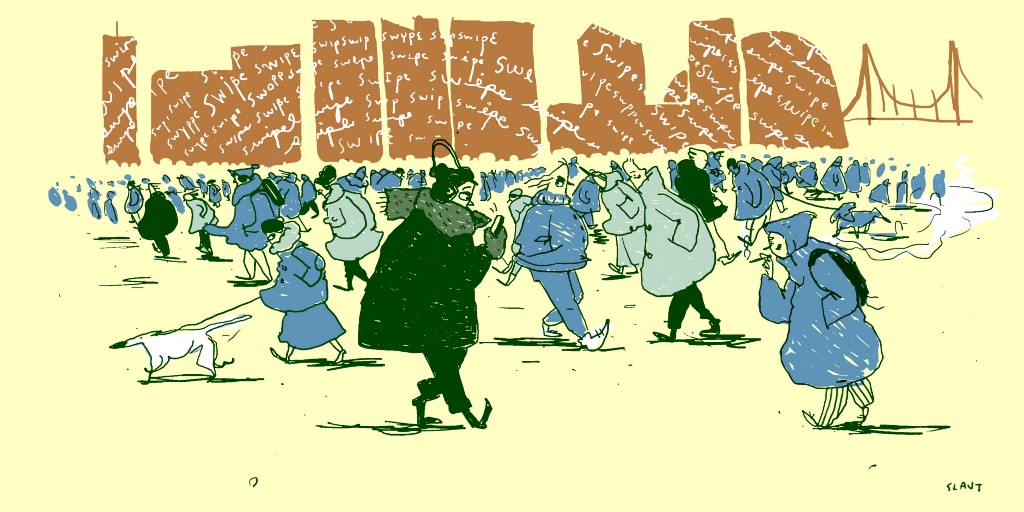Lit Mags
What is the Distance Between Two People?
“Word Problems,” short fiction by Chris Ames

What is the Distance Between Two People?
I f TRAIN A leaves the station going 60 miles per hour and TRAIN B leaves one hour later going 85 miles per hour, how long will it take TRAIN B to catch up with TRAIN A?
This example is just one of several word problems you will encounter in your life. Most word problems do not immediately identify themselves as such — rather you stumble into them on accident, perhaps over drinks with your significant other or in the backseat of a taxicab.
Let’s begin. Distance equals the rate times the time. In knowing that our distances are the same, we must first learn to set them equal to one another.
D = RT
D = 60T for TRAIN A
D = 85(T — 1) for TRAIN B
But you say wait no, not quite, our distances were never exactly the same. You were always slightly further away at all times, regardless of the reference point. During parties or dinner or sex, you made a series of small calculations to appear far off, not here, somewhere else. Whether or not you were actually deep in thought, you consistently had the look of someone attempting to hold a lot of numbers together, like doing long division in your head. This absence must be factored, you say. This nothing must be accounted for.
Yeah, okay, but that’s hypothetical distance, an imaginary number that while being complex and valid in its own way, is completely useless here, I say. For instance, let’s say we are walking through what some might call a shitty part of town. The kind of place where rock bottom rises to the surface, and nervous commuters quickly pass by the lowest point of someone else’s life. Isn’t it awful, you say. Let’s cross the street. I say no. That’s worse. It would be rude not to walk right through them. How is that helping? you say. By marching past a dying body, you don’t suddenly get to lay claim to their experience.
Because I believe other people’s tragedy is a thing you must learn to intake, like those trace elements in the air no one mentions — you know it’s there, you breathe it in, but it’s still just air. There’s no lingering feeling. You’re never thinking, this argon tastes strange.
That’s stupid, unproductive, doesn’t change anything. In putting yourself through a bad experience, you’re creating just enough tension to feel as though you’ve sacrificed something without actually doing anything. Their pain is your table stakes.
I swallow my tongue and check the time. I’ve never been good with words so I’ve learned to hide behind numbers. Oh look, we’re late.
60T = 85(T-1)
60T = 85T — 85
60T — 85T = -85
Some word problems present themselves clearly. For instance, in an argument over a weekend camping trip, someone might say something like, it’s not about the tent, it’s about what the tent represents. This is tricky, because at first it appears as though you are solving for tent, but you are in fact solving for x — tent. That is, everything else besides the collapsed tent in your hands — limp, formless, and looking nothing like a home. You decide to do what idiots do: ignore the instructions and work towards what you know to be true. Namely, tent. As you slip the silver poles through their tiny folds, maneuver the deflated casing around, and attempt to stake your claim, your partner continues to pursue the real heart of the problem: infinite universes that contain neither tents nor you.
It doesn’t stop there. Real word problems are more dynamic than textbook ones. Often, they mutate and compound even as they are being written. From tent and tent representation, we can easily phase to semantics and value deconstruction. It’s not what you said, but how, why, and when you said it.
Now, of all times.
Here, of all places.
You, of all people.
And even after it becomes clear we are no longer solving for tent, there is still the dull fact of needing to sleep somewhere. One way or another, a solution is found. You knew all along, they say. You only wanted to watch me struggle. You wanted to be proven right. How can you say that, you say. Where’s your proof?
-25T = -85
T = -85 / -25
T = 3.4
Three-point-four hours (204 min.) after TRAIN A leaves, TRAIN B will catch up to it. We know this because:
60*3.4 = 85(3.4–1)
204 = 85*2.4
204 = 204
Meanwhile, the real world contains hardly any proof whatsoever. It only takes a small amount of pressure on any known fact before it unspools into a mess of numbers. Just yesterday, you tried to receive a refund for a train ticket when, after waiting for 22 minutes, it had still not arrived. Exiting the turnstile, you got in line, waited your turn, and when signaled, spoke into a circular grid of holes drilled into a panel of plastic.
Hello I would like my money back, you say. I can’t do that, they explain. Why? Buying a train ticket has nothing to do with riding on a train, they say. We make no guarantees for trains, arrivals, departures, coming or going of any kind. So what am I buying? you say. You’re buying time — and the ability to stand over there versus over here. Solving for time, you exit the station understanding that whatever the operator gained was just lost by you.
No one ever explains what happens after TRAIN B catches up to TRAIN A, what that would look like, or why they are pursuing each other in the first place. This is what’s sometimes called a given — which is basically when someone doesn’t give you anything and hopes that’s okay. If these trains are on the same track, this is a word problem about other people’s tragedy. If they’re parallel, it could be about what the trains represent. If the trains are not even aware they are racing, it’s a case of over there versus over here.
Setting your distance, you call your partner from the platform. Both inbound and outbound trains arrive at the same time, making it difficult to hear one another. If you get home first, do you mind cleaning up? they ask. Make sure you wipe the residual spit off the toothbrushes, I have people coming over. If you get home first, can you start dinner? you say. I haven’t eaten all day and my mouth tastes like stomach acid.
Math is elastic, which is why even though there are an infinite number of word problems, there is really only one. It’s the reason — In order to make dinner the kitchen must be cleaned, but making dinner dirties the kitchen.
— can also be expressed as: I can’t relax until the house is clean, but I just want to relax before cleaning the house.
— or even: I don’t hate you, I just hate who I am when I’m with you.
Two-hundred-and-four minutes later, you take turns approaching zero to see who can get closest without actually touching. It’s entirely possible you’ve won but you have no proof.








